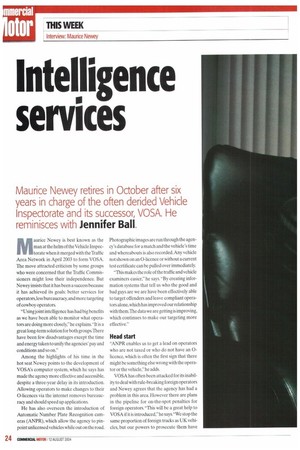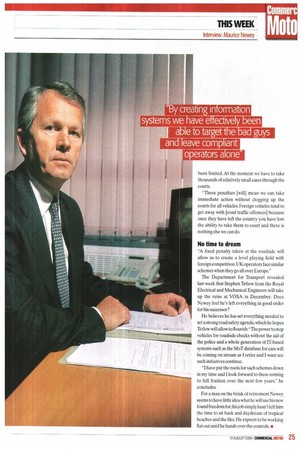Intelligence services
Page 24

Page 25

If you've noticed an error in this article please click here to report it so we can fix it.
Maurice Newey retires in October after six years in charge of the often derided Vehicle Inspectorate and its successor, VOSA. He reminisces with Jennifer Ball.
Maurice Newey is best known as the man at the helm of the Vehicle Inspectorate when it merged with the Traffic Area Network in April 2003 to form VOSA. The move attracted criticism by some groups who were concerned that the Traffic Commissioners might lose their independence. But Newey insists that it has been a success because it has achieved its goals: better services for operators,less bureaucracy, and more targeting of cowboy operators.
"Using j oint intelligence has had big benefits as we have been able to monitor what operators are doing more closely," he explains. "It is a great long-term solution for both groups.There have been few disadvantages except the time and energy taken to unify the agencies' pay and conditions and so on."
Among the highlights of his time in the hot seat Newey points to the development of VOSA's computer system, which he says has made the agency more effective and accessible, despite a three-year delay in its introduction. Allowing operators to make changes to their 0-licences via the interne.' removes bureaucracy and should speed up applications.
He has also overseen the introduction of Automatic Number Plate Recognition cameras (ANPR), which allow the agency to pinpoint unlicensed vehicles while out on the road. Photographic images are run through the agency's database for a match and the vehicle's time and whereabouts is also recorded. Any vehicle not shown on an 0-licence or without a current test certificate can be pulled over immediately.
"This makes the role of the traffic and vehicle examiners easier," he says. "By creating information systems that tell us who the good and bad guys are we are have been effectively able to target offenders and leave compliant operators alone, which has improved our relationship with them.The data we are getting is improving, which continues to make our targeting more effective."
Head start
"AN P R enables us to get a lead on operators who are not taxed or who do not have an 0licence, which is often the first sign that there might be something else wrong with the operator or the vehicle," he adds.
VOSA has often been attacked for its inability to deal with rule-breaking foreign operators and Newey agrees that the agency has had a problem in this area. However there are plans in the pipeline for on-the-spot penalties for foreign operators. "This will be a great help to VOSA if it is introduced," he says."We stop the same proportion of foreign trucks as UK vehicles, but our powers to prosecute them have been limited. At the moment we have to take thousands of relatively small cases through the courts.
"These penalties [will] mean we can take immediate action without clogging up the courts for all vehicles. Foreign vehicles tend to get away with [road traffic offences] because once they have left the country you have lost the ability to take them to court and there is nothing else we can do.
No time to dream "A fixed penalty taken at the roadside will allow us to create a level playing field with foreign competition. UK operators face similar schemes when they go all over Europe."
The Department for Transport revealed last week that Stephen Tetlow from the Royal Electrical and Mechanical Engineers will take up the reins at VOSA in December. Does Newey feel he's left everything in good order for his successor?
He believes he has set everything needed to set a strong road safety agenda, which he hopes Tetlow will allow to flourish:"The power to stop vehicles for roadside checks without the aid of the police and a whole generation of IT-based systems such as the MoT database for cars will be coming on stream as I retire and I want see such initiatives continue.
"I have put the roots for such schemes down in my time and I look forward to these coming to full fruition over the next few years," he concludes.
For a man on the brink of retirement Newey seems to have little idea what he will use his new found freedom for; his job simply hasn't left him the time to sit back and daydream of tropical beaches and the like. He expects to be working flat out until he hands over the controls. •
























































































































































































